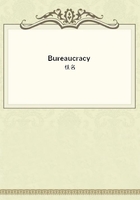
第46章 THE MACHINE IN MOTION(7)
"Why do you come in without being summoned?" said des Lupeaulx, harshly, when he and Dutocq were left alone. "Is the State in danger that you must come here at ten o'clock in the morning, just as I am going to breakfast with his Excellency?""Perhaps it is, monsieur," said Dutocq, dryly. "If I had had the honor to see you earlier, you would probably have not been so willing to support Monsieur Rabourdin, after reading his opinion of you."Dutocq opened his coat, took a paper from the left-hand breast-pocket and laid it on des Lupeaulx's desk, pointing to a marked passage. Then he went to the door and slipped the bolt, fearing interruption. While he was thus employed, the secretary-general read the opening sentence of the article, which was as follows:
"Monsieur des Lupeaulx. A government degrades itself by openly employing such a man, whose real vocation is for police diplomacy.
He is fitted to deal with the political filibusters of other cabinets, and it would be a pity therefore to employ him on our internal detective police. He is above a common spy, for he is able to understand a plan; he could skilfully carry through a dark piece of work and cover his retreat safely."Des Lupeaulx was succinctly analyzed in five or six such paragraphs,--the essence, in fact, of the biographical portrait which we gave at the beginning of this history. As he read the words the secretary felt that a man stronger than himself sat in judgment on him; and he at once resolved to examine the memorandum, which evidently reached far and high, without allowing Dutocq to know his secret thoughts. He therefore showed a calm, grave face when the spy returned to him. Des Lupeaulx, like lawyers, magistrates, diplomatists, and all whose work obliges them to pry into the human heart, was past being surprised at anything. Hardened in treachery and in all the tricks and wiles of hatred, he could take a stab in the back and not let his face tell of it.
"How did you get hold of this paper?"
Dutocq related his good luck; des Lupeaulx's face as he listened expressed no approbation; and the spy ended in terror an account which began triumphantly.
"Dutocq, you have put your finger between the bark and the tree," said the secretary, coldly. "If you don't want to make powerful enemies Iadvise you to keep this paper a profound secret; it is a work of the utmost importance and already well known to me."So saying, des Lupeaulx dismissed Dutocq by one of those glances that are more expressive than words.
"Ha! that scoundrel of a Rabourdin has put his finger in this!"thought Dutocq, alarmed on finding himself anticipated; "he has reached the ear of the administration, while I am left out in the cold. I shouldn't have thought it!"To all his other motives of aversion to Rabourdin he now added the jealousy of one man to another man of the same calling,--a most powerful ingredient in hatred.
When des Lupeaulx was left alone, he dropped into a strange meditation. What power was it of which Rabourdin was the instrument?
Should he, des Lupeaulx, use this singular document to destroy him, or should he keep it as a weapon to succeed with the wife? The mystery that lay behind this paper was all darkness to des Lupeaulx, who read with something akin to terror page after page, in which the men of his acquaintance were judged with unerring wisdom. He admired Rabourdin, though stabbed to his vitals by what he said of him. The breakfast-hour suddenly cut short his meditation.
"His Excellency is waiting for you to come down," announced the minister's footman.
The minister always breakfasted with his wife and children and des Lupeaulx, without the presence of servants. The morning meal affords the only moment of privacy which public men can snatch from the current of overwhelming business. Yet in spite of the precautions they take to keep this hour for private intimacies and affections, a good many great and little people manage to infringe upon it. Business itself will, as at this moment, thrust itself in the way of their scanty comfort.
"I thought Rabourdin was a man above all ordinary petty manoeuvres,"began the minister; "and yet here, not ten minutes after La Billardiere's death, he sends me this note by La Briere,--it is like a stage missive. Look," said his Excellency, giving des Lupeaulx a paper which he was twirling in his fingers.
Too noble in mind to think for a moment of the shameful meaning La Billardiere's death might lend to his letter, Rabourdin had not withdrawn it from La Briere's hands after the news reached him. Des Lupeaulx read as follows:--"Monseigneur,--If twenty-three years of irreproachable services may claim a favor, I entreat your Excellency to grant me an audience this very day. My honor is involved in the matter of which I desire to speak.""Poor man!" said des Lupeaulx, in a tone of compassion which confirmed the minister in his error. "We are alone; I advise you to see him now.
You have a meeting of the Council when the Chamber rises; moreover, your Excellency has to reply to-day to the opposition; this is really the only hour when you can receive him."Des Lupeaulx rose, called the servant, said a few words, and returned to his seat. "I have told them to bring him in at dessert," he said.
Like all other ministers under the Restoration, this particular minister was a man without youth. The charter granted by Louis XVIII.